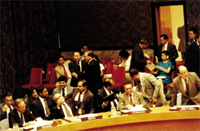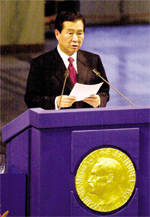Since its founding in 1948, the Republic of Korea has been committed to the concepts of democracy and a free-market economy, but its foreign relations have undergone significant changes since its founding. As U.S.-USSR relations divided much of the world into two antagonistic blocs following World War II, the Republic of Korea pursued its foreign relations in concert with the democratic nations of the West. In the years following the Korean War, the international community viewed Korea as a devastated, poverty-ridden state. But that image began to change in 1962 when the Republic of Korea adopted a policy of export-driven economic development and began to actively pursue international commerce worldwide.


South and North Korea joined the United Nations simultaneously in September 1991.
As confrontation sharpened during the Cold War, the Republic of Korea began to expand its foreign relations by improving ties with traditional allies and by building cooperative relations with Third-World nations. Since the 1970s, the diplomacy of the Republic of Korea has been designed to promote the independent and peaceful reunification of the peninsula. The ROK has also fortified its ties with allies and actively participated in international organizations.
With its diplomatic foundation firmly in place, the Republic of Korea continued throughout the 1980s to pursue cooperative partnerships with all countries in every field. In the late 1980s and early 1990s, epochal changes in Eastern Europe and the former Soviet Union brought an end to the Cold War, while the Republic of Korea moved swiftly to exploit the situation by actively promoting a "Northern Diplomacy."

Former President Kim Dae-jung, who won the Nobel Peace Prize in 2000
Energetic pursuit of the Northern Diplomacy policy greatly expanded the ties with former Communist-Bloc countries, ties that had languished due to ideological and structural differences. Relations with most of these countries, including the Soviet Union and China, were normalized in short order, thus enabling Korea's foreign relations to become truly global. South and North Korea joined the United Nations simultaneously in September 1991, crowning the success of the Northern Diplomacy.
Furthermore, the foundation for peaceful coexistence between the South and North was laid in December 1991, when they concluded the Agreement on Reconciliation, Nonaggression and Exchanges and Cooperation (the Basic South-North Agreement) and the Joint Declaration of the Denuclearization of the Korean Peninsula. These historic documents planted the seeds of peace on the peninsula and in Northeast Asia, representing an important first step toward the peaceful reunification of the divided nation.